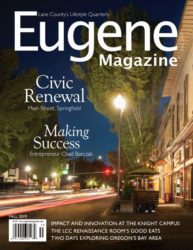Bec Williams is the founder and CFO (chief fun officer) of Playground Sports, organizing adult recreational sports leagues with a twist.
First, consider conventional sports like softball, bowling, basketball, and flag football. Those are Playground Sports material for sure. But now cast your thoughts outside the usual fields of play; think games like human foosball, dodgeball, human pool, soccer golf, cornhole, and kubb. Williams coined the term “retro-rec” for the assortment of less-conventional sports she promotes.
Retro-rec or traditional, all Playground Sports leagues promote the same key value: social engagement beats competition. Player fraternizing —often in a libations-friendly setting — is encouraged. Pubs and breweries are familiar post-game venues. “We’re kind of a friendship network,” Williams says. “Almost like the focus is on being like a kid as an adult.”
 The manner in which league play is orchestrated is equally emblematic of the Playground Sports approach. “Our leagues are a little different than city-run activities because we award things like social points,” says Williams. And team players, she points out, do stints as referees over the course of a season. “So, for example, it doesn’t matter if your team wins the kickball league,” she says. “You win the league trophy based on the points the referees give your team for how fun you are to play against.”
The manner in which league play is orchestrated is equally emblematic of the Playground Sports approach. “Our leagues are a little different than city-run activities because we award things like social points,” says Williams. And team players, she points out, do stints as referees over the course of a season. “So, for example, it doesn’t matter if your team wins the kickball league,” she says. “You win the league trophy based on the points the referees give your team for how fun you are to play against.”
Kickball tops the list of most popular leagues with 600 participants a season. Basketball trails slightly behind with nearly 30 teams. Enrollment across all Playground Sports activities will likely exceed 2,000 participants this year.
Teams design and display huge flags at their games. Players invent team slogans and chants. Some teams dress up in costumes. Early on, Playground Sports participants averaged 18 to 25 years old. More recently, there’s been a majority shift into the over-30 pool. Most teams host a mix of coed players; individual teams might lean toward singles, couples, or workmates.
“The point is to focus on recreation, not so much on competition,” Williams says. “I want people to participate in order to do something different. I want people to get out of their everyday rut and have fun.”

